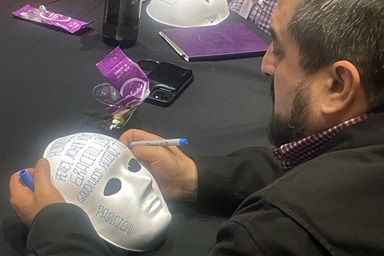The chairman of Black Methodists for Church Renewal urged members to work alongside others to challenge and ultimately eliminate covert and overt racism in The United Methodist Church and the nation.
The Rev. Cedrick D. Bridgeforth addressed the 48th annual gathering of the organized black caucus of the denomination, which met April 16-18.
“We now stand upon the shoulders of the giants, `she-roes’ and heroes, and the millions we will never know by sight or sound,” Bridgeforth said. “They sang songs of freedom while enslaved to send messages of liberation and freedom to their descendants who would one day own that land their foremothers and forefathers once tilled.
“And in the wake of all that, we still experience racism, and self-hatred is not afar off.”
The theme of this year’s meeting was “It’s Time to Take Action.” The group kept to its plan to meet in Orlando despite Florida’s high-profile deaths of young black men from gun violence.
In his address, Bridgeforth juxtaposed the word of Matthew 18, “Where two or three are gathered in my name, there am I in the midst,” with the chorus of the 1980’s hip hop song, “It Takes Two,” by Rob Base and DJ EZ Rock.
“If we are to take any meaningful action in our local churches, in our conferences, in our denomination, that has lasting positive impact on policies, politics, and behaviors that plague our people, and our communities, then we must remember: `It takes two to make a thing go right; it takes two to make it out of sight,’” Bridgeforth said.
BMCR is one of The United Methodist Church’s five U.S.-based ethnic caucuses. It represents more than 2,400 predominantly African-American congregations, translating to about 500,000 African-American members across the United States.
Advocacy work
The group’s work includes advocating for the interests and inclusion of black United Methodists in the general church structures; serving as a spiritual agitating conscience for the denomination; and raising prophetic and spiritual leaders.
Deborah Bell, BMCR’s vice chair, said Bridgeforth’s address “set the atmosphere for the theme.” She added that he noted goals accomplished and stressed the relevance of caucus today.
Bridgeforth highlighted several developments since last year’s gathering in St. Louis. One is the Black Papers Project. This catalog of papers and statements expressing BMCR’s positions on various topics and issues was written by African American bishops and other members of the caucus.
“This will permit us at any point to be quoted and engaged in emerging issues of our day,” Bridgeforth said. Topics include voter suppression, full inclusion in the church, mass incarceration, church closures, gender gap, and mental health.
Another development highlighted was the move of BMCR’s office from The United Methodist Publishing House in Nashville, Tennessee, to the campus of Gammon Theological Seminary in Atlanta. Two staff persons were hired: a manager of program and operations and a project manager.
As the denomination gets ready for General Conference 2016 in Portland, the caucus will again be an active participant with the Love Your Neighbor Coalition in pushing for passage of legislation. BMCR will be working in this regard with the other four US-based ethnic caucuses.
Attending the BMCR gathering was the Rev. Joel Hortiales, representing MARCHA or Metodistas Asociados Representando la Causa de los Hispano-Americanos.
“During the different conversations and presentations at BMCR, I learned that we are not allowed to forget where we came from, and we need to find passion again and go back to what brought us here, a meaningful relationship with Jesus,” he said.
Hortiales added: “We must have a collective commitment to be a voice for the voiceless.”
Working together
Bridgeforth stressed the need to work with other groups in the denomination on issues of racism.
The ethnic caucuses - BMCR, MARCHA, the National Federation of Asian American United Methodists, the Native American International Caucus , and the Pacific Islander National Caucus of United Methodists - had a historic first joint gathering last year. One of the results is a video series called "I Too, Am United Methodist.”
Since its 1967 inception in Detroit, BMCR has consistently been the voice of black United Methodists and an advocate for the growth and development of black churches. When The United Methodist Church was formed in 1968, the caucus effectively lobbied for the creation of the General Commission on Religion and Race and the desegregation of The United Methodist Publishing House.
BMCR also helped the denomination launch numerous other landmark mission initiatives, including the Black College Fund in 1970, the churchwide missional priority on Strengthening and Developing the Ethnic Minority Local Church (1976 to 1988), and Strengthening the Black Church for the 21st Century in 1996.
The list of ministries created, and continued, with the aid of BMCR include: Africa University, Black College Fund, Gammon Theological Seminary, and the Minority Self-Determination Fund.
The national organization encompasses sub-groups operating as local, conference, jurisdictional, and youth caucuses. These groups function as advocacy, ministry, and leadership development organizations addressing the needs and concerns of the members they represent.
Hygh is director of communications for the 360 churches and 78,000 members of the California-Nevada Annual Conference.
Like what you're reading? Support the ministry of UM News! Your support ensures the latest denominational news, dynamic stories and informative articles will continue to connect our global community. Make a tax-deductible donation at ResourceUMC.org/GiveUMCom.




